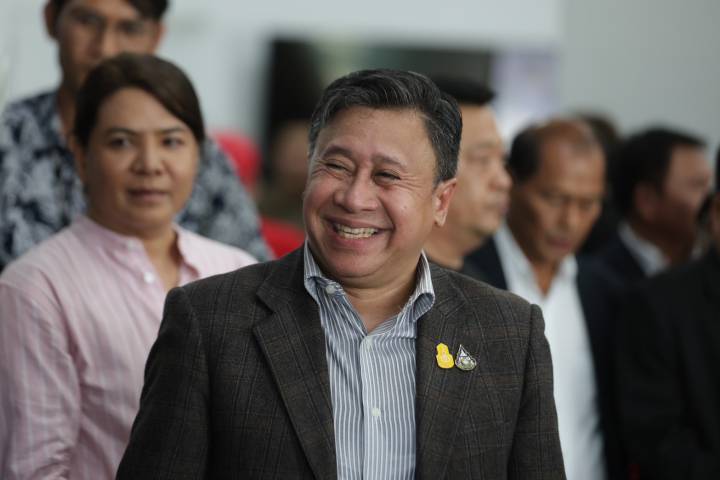Jakrapob Penkair, a previous minister in the Prime Minister’s Office and a leader of the red-shirt movement, has returned to Thailand after spending 15 years in self-imposed exile due to allegations of lese majeste and other accusations following the coups in 2006 and 2014.
Jakrapob also worked as the spokesperson in the government of Thaksin Shinawatra, who came back from exile last year after the Pheu Thai Party regained power. Thaksin is seen as the leader of Pheu Thai.
Experts believe that Jakrapob’s return could lead to more political exiles who are aligned with Thaksin returning later this year. Jakrapob stated to reporters shortly after returning on March 28 that he would help arrange for the return of these “political refugees” so they can challenge the criminal charges against them.
Jakrapob, aged 56, was arrested upon his return and handed over to the Crime Suppression Division to be notified of the remaining arrest warrant for his alleged involvement in an illegal group and possession of unregistered firearms and ammunition. He denied all allegations and was released on bail of 400,000 baht, according to his attorney.
In exile since 2009
Jakrapob was summoned by the coup leaders after the May 2014 power takeover that removed the government led by Thaksin’s representative Pheu Thai. He did not respond to the summons, as he had already left the country in 2009 after being accused of lèse-majesté. A military court then issued a warrant for his arrest.
In 2017, the junta accused Jakrapob of storing firearms and ammunition as part of an alleged plot to incite violence in the capital. The Criminal Court then issued a warrant for his arrest to face charges of possessing illegal weapons and involvement in an illegal group.
Upon arriving back in Thailand, Jakrapob informed reporters that he decided to return following “several positive changes” in his home country, with the “democratic camp” back in power and the political influence of “democracy’s destroyers” reduced.
He mentioned that he had spoken with Thaksin before making the decision to return.
Thaksin returned home last August after 15 years of self-imposed exile, spending six months of a one-year reduced prison term in a hospital before being released on parole in February.
Living in 5 countries
Jakrapob stated that both of his parents had passed away during his exile, but despite “longing for Thailand every day,” he was unable to return while living in the five foreign countries. He refused to name the countries, but his fellow former red-shirt leader Jatuporn Prompan mentioned that Jakrapob had mainly stayed in Cambodia but had flown back to Thailand from Dubai.
Born on October 21, 1967, Jakrapob earned a bachelor’s degree in international relations from Chulalongkorn University’s Faculty of Political Science followed by master’s and doctoral degrees from Johns Hopkins University’s School of Advanced International Studies in the US.
He became well-known as a television talk-show host and political commentator before entering politics. His charismatic personality and strong communication skills caught the attention of Thaksin, who appointed him as the spokesperson for his government in 2003.
Jakrapob ran for general elections in 2005 and 2006 with Thaksin’s Thai Rak Thai Party but did not win a seat. However, he was appointed deputy secretary-general to the prime minister after Thaksin returned to power.
Red-shirt founder
After Thaksin was removed in the 2006 military coup and his party was dissolved, Jakrapob helped create the People Television satellite TV station, which acted as a voice for anti-coup activists loyal to Thaksin. He also helped establish the red-shirt movement before it evolved into the United Front for Democracy against Dictatorship. He led several protests against the post-coup government of General Surayud Chulanont.
In 2007-2008, Jakrapob served as the Prime Minister’s Office minister in the administration led by Thaksin’s proxy, Samak Sundaravej.
During his time, Jakrapob started reforms that changed the state-run TV Channel 11 into the National Broadcasting Services of Thailand (NBT).
After 15 months in office, he was forced to resign in May 2008 when he was accused of slandering the monarchy in his talk on “Democracy and Thailand’s Patronage System” at the Foreign Correspondents’ Club of Thailand in August 2007.
In 2009, he reportedly left the country after a lèse-majesté lawsuit was filed against him, and did not return even after public prosecutors decided to not to indict him in 2011.
By Thai PBS World’s Political Desk









